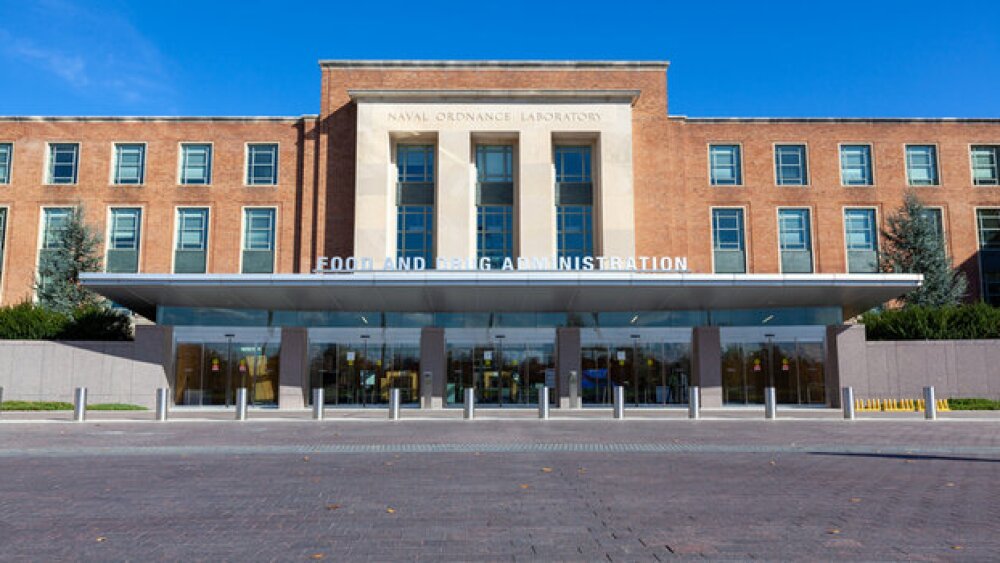The agency on Tuesday said it is investigating the “serious risk” of T cell malignancy outcomes, including hospitalization and death, and evaluating the need for potential regulatory action.
Pictured: Exterior of an FDA building/iStock, Grandbrothers
The FDA announced Tuesday that it is investigating the “serious risk” of malignancies in patients who received treatment with BCMA- or CD19-directed autologous CAR-T cell immunotherapies.
The regulator said it has determined that the risk of T-cell malignancies “is applicable to all currently approved BCMA-directed and CD19-directed genetically modified autologous CAR T cell immunotherapies” including Bristol Myers Squibb’s Abcema and Breyanzi, Johnson & Johnson’s Carvykti, Novartis’ Kymriah and Gilead’s Tecartus and Yescarta.
“T-cell malignancies have occurred in patients treated with several products in the class,” according to the FDA, which said it received reports from clinical trials and postmarketing adverse event data.
While the agency said that the overall benefits of these products continue to outweigh their potential risks, it “is investigating the identified risk of T cell malignancy with serious outcomes, including hospitalization and death, and is evaluating the need for regulatory action.”
The FDA noted in Tuesday’s announcement that the prescription information labels for approved BCMA-directed and CD19-directed genetically modified autologous T cell immunotherapies include the potential risk of developing secondary malignancies as a class warning. The approval of these products also includes postmarking requirements to conduct 15-year safety studies to assess safety and risk, according to the agency.
The regulator said that patients and those participating in clinical trials for CAR-T treatments should be “monitored life-long” for any new malignancies. If a new malignancy should occur after treatment, the manufacturer should be notified and the maker should get instructions on collecting patient samples for testing, the FDA added.
BioSpace reached out to several companies potentially impacted by the regulator’s announcement.
“We are confident in the overall safety profile of both Tecartus and Yescarta, having treated 17,700 patients to date, in both clinical trials and in the commercial setting. There is no evidence to date that treatment with Yescarta or Tecartus has a causal role in the development of new malignancies,” a spokesperson for Gilead’s Kite said in an emailed statement to BioSpace. “We have a rigorous process in place to continuously monitor for and report adverse events to regulatory authorities. We have fully cooperated with the FDA’s request for an analysis of our data related to this inquiry.”
A Novartis spokesperson in statement to BioSpace said that as part of its “continuous safety monitoring” the Swiss Pharma has not identified a causal relationship between Kymriah and secondary malignancies.
“We are fully committed to patient safety and will continue to work with the U.S. Food and Drug Administration,” the spokesperson added.
J&J’s Janssen spokesperson pointed out that “regulatory agencies require testing of secondary primary malignancies in patients receiving cell and gene therapies both in clinical research and in the commercial setting” as part of post-CAR-T therapy safety and surveillance. The company said it has shared data with the FDA and is working with the agency “as they assess this newly identified class-effect safety signal” while noting that more than 2,000 patients have been treated with Carvykti globally and the overall benefit-risk profile “remains favorable.”
BMS in a statement said it is aware of the FDA investigation into the risk of T-cell malignancy across all currently approved CAR T cell products and that it has treated more than 4,700 patients across clinical and commercial settings with the company’s Abecma and Breyanzi.
“To date, BMS has not observed any CAR-positive T-cell malignancy cases and therefore, we have not found a causal relationship between our products and secondary malignancies. Patient safety is a top priority for BMS, and we remain confident in the safety profile and clinical value of our cell therapies,” the company said in its statement.
Last week, BMS and 2seventy bio announced that the FDA has decided to convene its Oncologic Drugs Advisory Committee to discuss the companies’ proposed use of Abecma in earlier lines of treatment for triple-class exposed relapsed or refractory multiple myeloma. The advisory committee meeting has no scheduled date yet. However, it will mean that the regulator will miss its previously announced target action date of Dec. 16.
Tyler Patchen is a staff writer at BioSpace. You can reach him at tyler.patchen@biospace.com. Follow him on LinkedIn.






